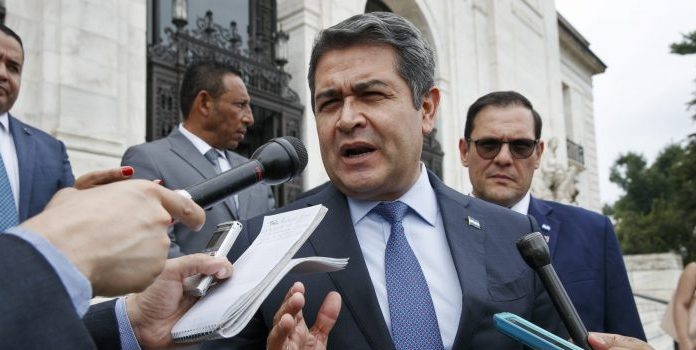(Headline USA) After years of speculation in Honduras, the United States formally requested the arrest and extradition of former President Juan Orlando Hernández less than three weeks after he left office.
Honduran security forces surrounded Hernández’s neighborhood Monday night, and the Supreme Court of Justice scheduled an urgent meeting Tuesday morning to select a judge to handle the extradition request. A standoff ensued.
In a video released by Hernández’s legal team from apparently inside his home, attorney Félix Ávila said that everything would have to wait until the Supreme Court designated a judge Tuesday to consider the case. “Meanwhile, it is understood that no arrest order exists.”
However, at a police barrier to the neighborhood, Rasel Tomé, vice president of the newly elected National Congress, said that Hernández had to turn himself in or he would be captured at 6 a.m. Tuesday.
Shortly before that deadline, Hernández released an audio recording via Twitter early Tuesday thanking those praying for him.
— Juan Orlando H. (@JuanOrlandoH) February 15, 2022
“It is not an easy moment,” he said. “I don’t desire it for anyone.”
He said the National Police had already been informed by his lawyers that “I am ready and prepared to cooperate and go voluntarily with their accompaniment in the moment the judge designated by the honorable Supreme Court of Justice decides it, to be able to face this situation and defend myself.”
It was a long-awaited fall for a leader who enjoyed support from the Trump administration but had been kept at arm’s length by a Biden White House targeting Central America’s endemic corruption as a root cause of migration.
His rapport with Trump was contingent largely on Hernández’s willingness to comply with Trump’s demands that he cooperate with US immigration enforcement or face the withholding of funds.
The Biden administration, however, has restored much of the cash-flow while permitting the US–Mexico border to remain unsecured.
The specific charges Hernández’s faces are not known, but federal prosecutors in New York had previously named him a co-conspirator in a drug trafficking case, alleging that his political rise was fueled with drug profits.
Hernández has long denied any wrongdoing.
Nicole Navas, a spokeswoman for the U.S. Department of Justice, declined to comment.
Hernández left office Jan. 27 with the swearing in of President Xiomara Castro, a member of the far-left, anti-capitalist Libre Party.
The same day, Hernández was sworn in as Honduras’s representative to the Central American Parliament.
His lawyer, Hermes Ramírez, told local media his client had immunity as a member of the regional parliament and said government forces were not following proper procedures. He said Hernández was inside the home.
Various contingents of the National Police, including special forces, as well as military police were present around Hernández’s neighborhood Monday night. Barriers at all of the entrances kept out media and even residents.
Members of the security forces entered the area with weapons, wearing balaclavas and with handcuffs dangling from their ballistic vests. Some neighbors said the house had been dark and that they believed it to be unoccupied.
Hernández often pointed to the fact that Honduras began allowing the extradition of Hondurans on drug trafficking charges while he was president of the congress as part of his defense.
But U.S. prosecutors have alleged that he was taking bribes from drug traffickers on the promise of protecting them once he was Honduras’s president.
U.S. prosecutors in New York repeatedly implicated him in his brother’s 2019 drug trafficking trial, alleging that his political rise was fueled by drug profits.
That brother, Juan Antonio “Tony” Hernández, himself a former Honduran congressman, was sentenced to life in prison on drug and weapons charges in March 2021.
At his sentencing Assistant U.S. Attorney Matthew Laroche characterized the crimes as “state-sponsored drug trafficking.”
Juan Orlando Hernández took office Jan. 27, 2014. Hernández used a friendly Supreme Court to overcome Honduras’s constitutional ban on reelection and won a second term in 2017 in elections marred by irregularities.
Around midnight Monday, 56-year-old Jorge Arturo Vega, a supporter of Castro’s Liberty and Refoundation party, stood outside a police barricade at Hernández’s neighborhood celebrating.
“This is a party we’ve been waiting a long time for,” Vega said, thinking back over the dozen years since Hernández came up in the congress. “We couldn’t stand this his drug trafficker, criminal, killer in the presidential house any longer.”
Adapted from reporting by the Associated Press

